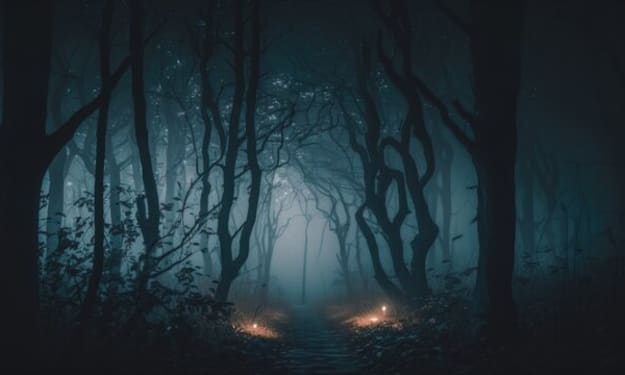The Zebulonian Curse
life and death are in the power of the tongue

Along the banks of an expansive, umber-tinted river sat Ann and Luke. The friends were enjoying a mild, sunny June day.
"This is such a pretty sight," Ann said, her shoulder-length, coiled brunette hair blowing in the wind.
"Eh, it's alright. There are much nicer sights out there. Y'know, look at the Smoky Mountains or the Great Lakes," Luke countered. "Here, it's just boring, the river's brown, and there's not much to do."
She looked into Luke’s sparkling blue eyes. "But this city has its own beauty. The river is huge. Just think, we could hop on a boat and make it all the way to the Mississippi River. That's amazing!"
"True."
"See, that's what I don't get about this city. There's so much beauty here. You have this massive river, and on both sides you see these green, rolling hills. You’ve got very nice parks with lush grass and lots of colorful flowers and trees. But all of it's taken for granted, and this city does nothing with it. I don't get it."
"Welp, according to legend, there was a time when this city was up and coming, and rivaled places like LA and Chicago. Then, there was the Summer Solstice."
"The Summer Solstice?"
"Yeah, the Summer Solstice of 1919. According to local legend, that's when everything changed."
***
It was the early twentieth century in the southwest Ohio city of Losanti, Ohio. Located along the banks of the Ohio River, this bustling metropolis was the home of beef - lots of beef - so much so, that the city was nicknamed "Beefopolis." The cattle farms in the rural areas of Ohio, Kentucky, and Indiana supplied the slaughterhouses and factories in the urban center. The meat, milk, and cheeses produced in Losanti were especially delectable and were considered hot commodities. This industry led to the formation of a conglomerate called the Ohio Dairy Union, or "The Dairy Union" for short, which operated small stores that exist to this day.
All manner of folks flocked to Losanti for a better life. The influx of people led to increased opportunities for entrepreneurship. Shops, services, and nightlife cropped up in the city. Bars, nightclubs, and even brothels flourished as the long-time residents and new arrivals mingled, and enjoyed both spirits and live entertainment.
Dismayed by the drunkenness and vice in the growing city, some Losantians sought the divine for help. In 1917, a traveling preacher named Zebulon T. Johnston arrived in the city from parts unknown, and founded a storefront church just west of downtown named Tribe of the Living God Temple. Over the next year, the upstart house of worship attracted hundreds of worshipers.
The newspapers derisively referred to the church's congregants as the Zebulonians. They were easily detected by their outdated, drab outfits. The men wore plain black suits and beards, which were out of fashion at the time. The women wore long plain dresses, long hair, and matching bonnets, and refused to wear makeup. The followers were notorious for aggressively proselytizing in front of taverns, brothels, and clubs. In addition, the Zebulonians were teetotalers who supported the ongoing ratification of the Eighteenth Amendment to the US Constitution, which would prohibit the manufacture, transportation, and sale of alcohol.
Worship services were held all day Sunday, and Wednesday nights were reserved for corporate prayer. Reverend Johnston, as he was known, preached piety, modesty, and evangelism. Typical Sunday services included the reverend excitedly preaching to his eager congregation.
"I’ve got a word for you today - amen?" said the bearded man of about thirty-five dressed in an ill-fitting, dusty black suit.
The congregation responded, "Amen!"
"In Matthew 24, the disciples asked Jesus, 'What are the signs that the end of the world is nigh?' And Jesus told the disciples of wars, and rumors of wars, famine, pestilence, earthquakes."
The crowd nodded in agreement.
The reverend continued. "Now, our young men have been sent to perish in a European war that has nothing to do with these great United States of America. We are facing pestilence, as the fit among us fall ill with the purple death and leave this earth too soon. And how many of you have arrived from places wrought with earthquakes and twisters?"
Some raised their hands.
"All of this horror is occurring because our world is full of sin and dishonors the Lord our God! Amen?"
"Amen!"
"When you leave this sanctuary, you will see a fallen world. You will see saloons, cabarets, houses of ill repute. The ladies of the world are immodest, wearing austere colors, painting their faces, wearing jewels, donning skirts with short hems and sleeves that display their arms. And the men of the world are spending their last dime on hedonism and vice. The world is full of drunks, vagrants, and harlots. We are surrounded in all corners by sin – sin! Amen?"
"Amen!"
"But the Lord our God will wipe the slate clean right soon...in fact, in less than one year. On the twenty-second of June, nineteen-hundred and nineteen, the day of the Summer Solstice."
The crowd nodded.
"The Summer Solstice, the longest day of the year, has marked the transition from one age to the next for generations. Those who came before us have tarried, worshiped, and prayed fervently during the Solstice for God's favor on his people, and the destruction of the wicked. And God has always delivered. Amen?"
"Amen!"
"On the final Summer Solstice, when the sun is highest in the sky, this sinful, fallen world will be destroyed once and for all. Yet we, the righteous, will be taken up to Heaven - the living and the dead who were righteous in God's sight - we will all be in paradise with Jesus Christ for eternity. Amen?"
The crowd stood from the pews and roared, "Amen!"
***
At dawn on June 22, 1919, a crowd of several thousand Zebulonians, locals, newspapermen, and curious onlookers from all over the region arrived on the northern banks of the Ohio River for an all-day revival in anticipation of the end of the world, as Reverend Johnston prophesied.
"The final day is upon us!" the preacher proclaimed to the largest group he had ever entertained. "We tarry, and we pray without ceasing, for the righteous to ascend to the heavens and the world to be torn asunder by fire and brimstone, and plunged into the depths of hell."
The crowd voiced, "Ooh!"
"If you have not yet accepted the God-given word and prophecy of his faithful servant Zebulon T. Johnston, now is your chance to join the elect!"
Those who gathered on the riverside prayed and wept loudly. Some men, women, and children walked up to the makeshift altar in front of the reverend's soapbox and pledged themselves to the movement.
"We increase our number! Yes Lord! Amen?"
"Amen!" roared the crowd.
After several hours of waiting in loud prayer and worship, the sun was highest in the sky. The crowd began to quiet down, anticipating the departure of the chosen and the destruction of what remained. As the sun passed its apex, a few in the crowd grumbled.
"We're still here!"
"Why are we not in heaven?"
"Where is the fire and brimstone?"
People in the crowd, followers and onlookers alike, began to look at each other in confusion.
The famous preacher, noticing the bewildered crowd, shouted, "Hold onto your faith! The Lord will act very, very soon."
As the minutes dragged on, the crowd grew more anxious.
"We haven't been taken up!"
"Was the great reverend wrong?"
"What if we missed it?"
Reverend Johnston sought to calm the unnerved crowd. "Behold! The Lord has come to me, and in his infinite mercy, he has given us a reprieve. We have another year to get right with the Lord. Let us rejoice!"
Rather than soothing the masses, they became agitated.
"False prophet!"
"Liar!"
"Get him!"
"Fraud! Get him!"
As the throng angrily moved towards the discredited preacher, he backed away from the pulpit and yelled, "The prophecy was not fulfilled because all of you lack faith! Because you did not believe, this town of Losanti is now cursed! Your beautiful city will no longer be the Beacon of the Ohio Valley, the Star of the Midwest! Losanti will slide into obscurity and mediocrity now and forever!"
With that, Reverend Zebulon T. Johnston turned and ran from the enraged crowd. He disappeared over the hills of the city, never to be seen again.
In the ensuing years, Losanti declined into obscurity, as the disgraced prophet had predicted. With Prohibition, the bars closed. The speakeasies, nightclubs, and brothels moved across the river to the tobacco processing town of Marboro, Kentucky. The Great Depression in the 1930s ended Losanti's status as a chief beef processing hub. Even after economic recovery arrived in the region, Losanti would never again regain its former glory.
In the ordinary river city of Losanti, Ohio, the Zebulonian Curse remains in effect to this very day.
About the Creator
Jaye Pool
Jaye Pool was born and raised in Detroit, Michigan, and currently resides in Cincinnati, Ohio, where she has lived for two decades. She hosts Potstirrer Podcast, which has political and religious themes. She is writing her first two novels.
Enjoyed the story? Support the Creator.
Subscribe for free to receive all their stories in your feed. You could also pledge your support or give them a one-off tip, letting them know you appreciate their work.






Comments (1)
Excellent take on the challenge, fire and brimstone indeed